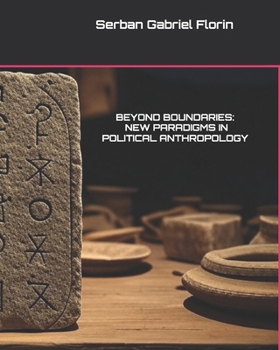Beyond Boundaries: New Paradigms in Political Anthropology
In the ever-evolving landscape of political anthropology, traditional paradigms have long privileged institutional structures, formal power narratives, and state organization.
However, as our understanding of social dynamics deepens and global interconnectedness intensifies, there is a growing recognition that these established frameworks may no longer suffice to capture the complexities of contemporary political formations.
This work proposes an epistemological rupture through the introduction of the "identity transitories" paradigm-a novel framework that acknowledges the fluid, contingent, and relational nature of political identities and processes in the 21st century.
The "identity transitories" paradigm stands for more than a mere extension of existing theories; it forms a fundamental rethinking of what we consider "the political."
By emphasizing the transitory nature of identities and the interconnectedness of various social subsystems, this approach challenges researchers to suspend disciplinary certainties and embrace the ambiguity inherent in contemporary political realities.
This paradigm shift is particularly timely as we grapple with emerging phenomena such as transnational communities, fluid social movements, and the digital reconfiguration of power dynamics that defy traditional categorizations.
Political anthropology has historically been tethered to static visions that separate the political from other dimensions of social life.
This compartmentalization, while useful for analytical purposes, has increasingly been recognized as inadequate for understanding the complex interplay between politics and other societal domains.
Traditional approaches have often overemphasized formal political institutions and state structures, neglected the role of informal power dynamics and non-state actors, struggled to account for the fluidity of political identities in a globalized world, and underestimated the impact of digital technologies on political processes.
These limitations have become more pronounced as the field of political anthropology has expanded its scope to include complex societies and state-level politics.
The need for a more nuanced and flexible analytical framework has never been clearer.
The proposed "identity transitories" paradigm stands for a significant ontological and epistemological shift in how we conceptualize and study political phenomena.
This approach is grounded in several key principles: the fluidity of political identities, the contingency of political formations, the relationality of political dynamics, the liminality in political transitions, and the multidimensionality of power.
By recognizing that political identities are not fixed but constantly in flux, shaped by various social, cultural, and historical factors, this paradigm challenges traditional notions of bounded political entities.
It also acknowledges that political structures and processes are contingent upon specific contexts and can rapidly transform in response to changing circumstances.
Furthermore, it emphasizes the interconnectedness of political processes with other social domains, including economics, culture, and technology.
This paradigm draws inspiration from various theoretical traditions, including post-structuralism, actor-network theory, and complexity theory.
It also builds upon recent developments in anthropological thinking that highlight the interconnectedness of social subsystems and the importance of studying politics in its broader sociocultural context.
By integrating these perspectives, the "identity transitories" paradigm offers a comprehensive framework for understanding the complex interplay between political, social, and technological factors in contemporary societies.
However, as our understanding of social dynamics deepens and global interconnectedness intensifies, there is a growing recognition that these established frameworks may no longer suffice to capture the complexities of contemporary political formations.
This work proposes an epistemological rupture through the introduction of the "identity transitories" paradigm-a novel framework that acknowledges the fluid, contingent, and relational nature of political identities and processes in the 21st century.
The "identity transitories" paradigm stands for more than a mere extension of existing theories; it forms a fundamental rethinking of what we consider "the political."
By emphasizing the transitory nature of identities and the interconnectedness of various social subsystems, this approach challenges researchers to suspend disciplinary certainties and embrace the ambiguity inherent in contemporary political realities.
This paradigm shift is particularly timely as we grapple with emerging phenomena such as transnational communities, fluid social movements, and the digital reconfiguration of power dynamics that defy traditional categorizations.
Political anthropology has historically been tethered to static visions that separate the political from other dimensions of social life.
This compartmentalization, while useful for analytical purposes, has increasingly been recognized as inadequate for understanding the complex interplay between politics and other societal domains.
Traditional approaches have often overemphasized formal political institutions and state structures, neglected the role of informal power dynamics and non-state actors, struggled to account for the fluidity of political identities in a globalized world, and underestimated the impact of digital technologies on political processes.
These limitations have become more pronounced as the field of political anthropology has expanded its scope to include complex societies and state-level politics.
The need for a more nuanced and flexible analytical framework has never been clearer.
The proposed "identity transitories" paradigm stands for a significant ontological and epistemological shift in how we conceptualize and study political phenomena.
This approach is grounded in several key principles: the fluidity of political identities, the contingency of political formations, the relationality of political dynamics, the liminality in political transitions, and the multidimensionality of power.
By recognizing that political identities are not fixed but constantly in flux, shaped by various social, cultural, and historical factors, this paradigm challenges traditional notions of bounded political entities.
It also acknowledges that political structures and processes are contingent upon specific contexts and can rapidly transform in response to changing circumstances.
Furthermore, it emphasizes the interconnectedness of political processes with other social domains, including economics, culture, and technology.
This paradigm draws inspiration from various theoretical traditions, including post-structuralism, actor-network theory, and complexity theory.
It also builds upon recent developments in anthropological thinking that highlight the interconnectedness of social subsystems and the importance of studying politics in its broader sociocultural context.
By integrating these perspectives, the "identity transitories" paradigm offers a comprehensive framework for understanding the complex interplay between political, social, and technological factors in contemporary societies.
Format:Paperback
Language:English
ISBN:B0F28W9983
ISBN13:9798313765761
Release Date:March 2025
Publisher:Independently Published
Length:444 Pages
Weight:1.93 lbs.
Dimensions:0.9" x 8.0" x 10.0"
Customer Reviews
0 rating





